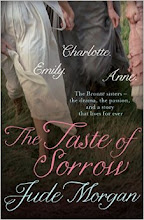I'd never come across
Wish Her safe At Home before, and I saw it lying on a table as I was on my way to pay for a few others I'd never come across before at Daunt Books in London. The cover pulled me towards it - I love a bit of vintage glamour, and the title was intriguing. I started reading John Carey's introduction, about how he had unsuccessfully championed it when it was longlisted for the Booker years ago, and so, always a fan of the underdog, I decided this needed reading. Oh, and it's about a middle aged woman going mad, so naturally, it appealed on that level too...
It is an uncomfortable book, let's get that straight from the get-go. It niggles at the reader, not least because there is the fear, I think, in all of us, that we sometimes skate on the slippery boundary between imagination and insanity. What makes
Wish Her safe At Home stand out as a study of increasing madness is that it is written from the point of view of the person going mad. Rachel tells her story, oblivious herself to her increasing retreat from reality, and so we, reading between the lines, begin to cringe at what are clearly, to start with at least, minor social
faux pas, but which become a full blown
Baby Jane-style breakdown.
There comes a point when we realise that Rachel's internal monologue may no longer be quite so internal as she thinks - that she may in fact be saying aloud a lot of the things she believes she is thinking. Conversely, there are times when she
claims to have said something, but we are not so sure that she actually
did. And herein lies Stephen Benatar's genius. There is a scene in church, enough to make you want to read with your head beneath your bedcovers, so appallingly embarrassing is it, in which Rachel comments throughout the sermon, throwing in opinions and questions of her own, completely inappropriately. But how much of it is said aloud, and how much is merely Rachel reciting the witty retorts she wishes she had been brave enough to make, is impossible to work out. And this is where the fear factor comes in - we begin to question ourselves whether or not we
really keep our internal monologues inside, or whether perhaps, occasionally, we let slip the odd comment not meant for other ears...and, once begun, how quickly might that escalate...how soon might something we have created in our imaginations begin to spill over into our real lives, leaving us spinning in the no-man's-land between the tangible and the fantastical, with no way of reaching the frontline of either, and therefore never knowing what is actual and what is make-believe. In short, Rachel makes us wonder how close we are ourselves to insanity.
Wish Her Safe At Home took me a little while to get into - though once its secret is revealed, it becomes sickeningly compelling. Not much
happens to start with. We become acquainted with Rachel as she inherits a house from a recently deceased Aunt and moves in, alone. She decorates, has the garden landscaped, and becomes good friends with the young gardener and his wife and new baby. And here, again, Benatar's genius rears its complicated head: to what extent are this couple genuine, we find ourselves asking, and how much is an attempt to take advantage of a lonely middle-aged (seemingly wealthy) woman, with no children to inherit her estate... They ask her to be godmother to their son, and our hackles rise. We are protective of Rachel and suspicious of the motives of others. Benatar manipulates our emotions with precision. Small incidents begin to worry us - did she
really say that to the chemist? Is she starting to
see things? Her confidence blossoms, which is at first wonderful...but then it starts to take her over and she becomes rude and bolshy, though also painfully hilarious. She contradicts herself. She had told us at the beginning that she was a plain child, but now is telling us that even her school teachers were jealous of her beauty... We daren't read on. But we
must read on.
This book has the slightly camp quality that so often accompanies the artistic portrayal of a woman breaking down. It references
A Streetcar Named Desire,
Miss Jean Brodie,
Miss Havisham... one could easily add the Beales of
Grey Gardens and
Whatever Happened to Baby Jane to the list. What is both sad and beautiful is that Rachel herself identifies with these characters. She sees them as heroines, pioneers, romantic peers. It is heartbreaking that at the end, she is delighted, rather than devastated, to be able to quote Blanche Dubois with reference to her own situation: "I depend upon the kindness of strangers," she says, happily, and promptly replaces her bonnet and turns her face from reality for good.
 Gregory Peck is in more thoughtful mood...
Gregory Peck is in more thoughtful mood...
 James Dean's choice of article to read aloud seems to have sent Liz Taylor to sleep.
James Dean's choice of article to read aloud seems to have sent Liz Taylor to sleep.






